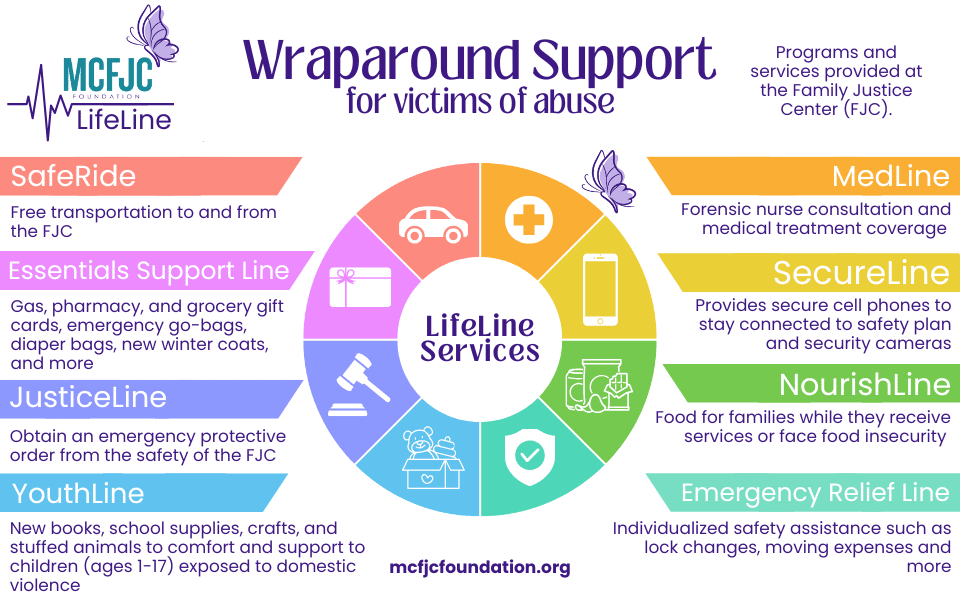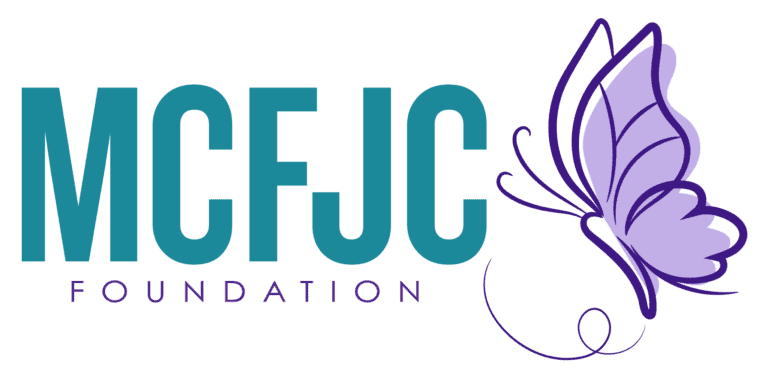The Montgomery County Family Justice Center Foundation (MCFJC Foundation) raises awareness and provides support to victims of power-based violence, including domestic violence, elder abuse, and teen dating violence. We strengthen services at the Family Justice Center (FJC) by removing barriers that prevent victims from accessing assistance and ensuring their safety. Our work promotes healing and fosters healthy relationships for victims and their children.

LifeLine Direct Services
Our LifeLine programs remove barriers that prevent victims of abuse from accessing essential support to escape abusive relationships, heal from trauma, and thrive as survivors of intimate partner violence. Examples of these programs include:
- SafeRide – Provides free emergency transportation for victims of domestic violence and their children, connecting them to essential locations such as the Family Justice Center, medical facilities, legal appointments, and court hearings. By addressing transportation challenges, we ensure that victims can access the support and services they need to break free from abuse and rebuild their lives.
- Emergency Relief Line (ERL) – The primary goal is to directly impact the safety, wellness, and healing of survivors in their journey towards a violence-free life. By providing individualized, critical emergency support to victims of domestic violence and their children, ERL offers a range of assistance, including changing locks, support for medical treatment, and replacing stolen identification.
- JusticeLine – This service enables victims of abuse to obtain emergency protective orders safely from the Family Justice Center using Polycom equipment. Approximately 80% of these emergency protective orders become final, compared to just 50% of those filed directly through the courts. Additionally, the MCFJC Foundation supports on-site pro bono legal services at the Family Justice Center, ensuring that domestic violence victims have access to critical legal assistance without financial barriers. In the past year, this initiative has helped victims file over 235 emergency protective orders, providing immediate protection to those in need.
- MedLine – This partnership with Shady Grove Medical enables virtual forensic medical consultations at the Family Justice Center using Polycom equipment. This program provides free one-on-one consultations with a forensic nurse for survivors who have suffered physical injuries, particularly strangulation. This connection between survivors and forensic nurses made through the FJC increases the likelihood of victims seeking necessary medical care.
- SecureLine – Digital abuse is a common method of control used by an abuser to track, monitor, and stalk their victim. Abusers compromise or destroy phones as a method to further isolate their victim. This program provides cell phones equipped with data and minutes. These phones are a critical element in the safety plan for a victim who is in the process of leaving an abusive relationship.
- Essentials Support Line – This program provides critical resources to victims of abuse who have been denied access to basic necessities or cannot safely return home to retrieve them. This program ensures victims can meet their immediate needs through a combination of resource cards and essential items. These include gas cards, grocery cards, Target and other cards for various essential items. Additionally, the program supplies emergency overnight/go bags tailored for adults, teens, and children, diaper bags for infants and toddlers, and seasonal necessities such as new winter coats, hats, gloves, baby blankets, and more. In 2023, the program distributed 600 new winter coats, 2,000 stuffed animals, 175 emergency go bags, and 350 gift cards for gas, groceries, and other essentials, providing invaluable support to victims during their time of transition and recovery.
- NourishLine – Provides food and water to victims of domestic violence and their children while they are getting services of the Family Justice Center or facing food insecurity as they are seeking safety from an abuser. It aims to address the alarming issue of hungry children as a leading cause for victims of domestic violence to prematurely withdraw from the support of the Family Justice Center after seeking help.
YouthLine Programs for Children Exposed to Domestic Violence
- Ready to Learn – Provides backpacks filled with MoCo County suggested school supplies for children and teens exposed to domestic violence who do not have these items. Exposure to domestic violence can lead to difficulty in school. Having appropriate, new school supplies can be the first step in helping to remove roadblocks in learning and pave the way for improved learning outcomes. In 2024, we provided 150 backpacks. Wishlist on amazonsmile: https://a.co/5FHtBZL
- Reading Ready Program – Reading can serve as a beneficial escape for children and teens experiencing stress due to domestic violence. By providing access to new books, this program promotes literacy and helps maintain reading proficiency for children in such circumstances. The brand new books provided to each child and teen are available in both English and Spanish to cater to diverse language needs.
- Summer Enrichment Packs for Teens and Children – The program provides essential items such as sunscreen and insect repellent, along with crafts, journals, puzzles, books, and sports equipment to children and teens exposed to domestic violence. The program aims to foster creativity, encourage healthy play, and promote physical activity. By addressing potential isolation, depression, and food insecurity, particularly during the summer break when they are not in school, this program supports the well-being and development of children and teens in these challenging circumstances. In 2024, the program provided 75 packs.
Youth Initiative Programs for Teenagers
One in ten Maryland teens experiences physical and/or sexual abuse in a dating relationship, making it one of the strongest predictors of abusive relationships in adulthood. Programs that raise awareness about teen dating violence, digital safety, consent, and healthy relationships are essential in empowering young people to recognize red flags, set boundaries, and build a future free from abuse.
- Choose Respect Initiative – Programs that promote respect in dating relationships and to raise community awareness about the prevalence of teen dating violence. Programs include:
- RespectFest – An annual free event for middle and high school students, parents, teachers, and youth care providers that educates the community about the warning signs of teen dating abuse, provides resources for assistance and promotes healthy relationships. Offered in both English and Spanish, approximately 1,000 students participated in 2024.
- PSA Video Contest – An opportunity for middle and high school students to earn SSL hours and a chance to win a $1000 prize for creating a video addressing dating violence, signs of abuse and highlighting resources for support. MCPS uses these videos throughout the year to promote awareness in schools.
- Expect Respect – 45-minute interactive workshops available in English and Spanish about types of dating violence, consent, warning signs for both the victim and the abuser, how to help a friend who is a victim or an abuser, and resources for help.
- Club P.R.O.V.I.D.E. – High school clubs in Montgomery County dedicated to raising awareness about teen relationship violence and promoting healthy relationships through workshops, community activities, and peer-led discussions. The club provides opportunities for students to volunteer, fundraise, and intern, empowering them to take action and support their peers in building safe and respectful relationships.
Programs for Community Outreach, Education, and Intervention
- Domestic Violence Coordinating Council (DVCC) – The Foundation supports various initiatives that reduce the incidence of domestic violence and create a safe community for families to live free of abuse.
- World Elder Abuse Awareness – The Foundation supports Montgomery County’s annual conference to raise awareness about elder abuse and available resources for support.
